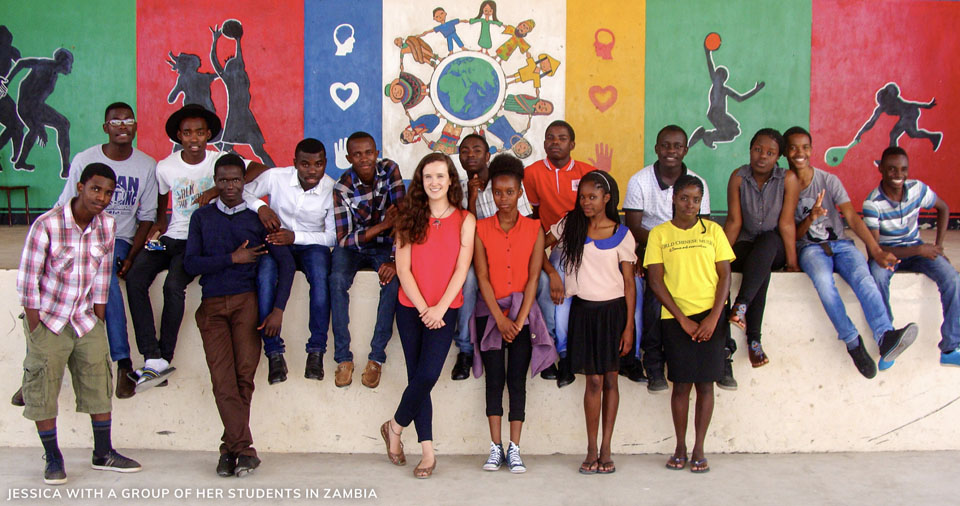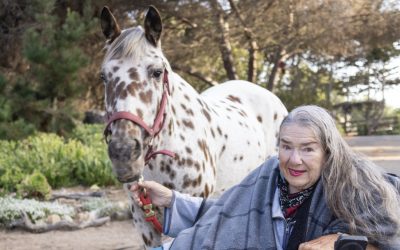Jessica Clarkson discovered her talent for the vocal arts when she took choir at Laguna Middle School. It led to private voice lessons, a starring role in a musical, selection to the American Choral Director’s Association Western Regional Choir and to the National Honor Choir in 8th grade. “I had a choice,” Jessica said, “between different electives, but it wasn’t really a choice. I had to do it. I didn’t realize I had a particular talent, but it was natural to me. The same thing happened at San Luis Obispo High School. I wanted to take journalism, but it was the same time as choir. The decision was easy.”
In her senior year, 2006-07, the high school choir traveled to Slovenia, Austria and Germany, including Stuttgart, which factored into another side of Jessica’s academic life. “I became really good friends with the international students, including the exchange student from Stuttgart. She and the other German students encouraged me to apply for the German School Committee scholarship and exchange program. You’re supposed to do that when you’re in high school, but only two of us applied that year and we both graduated, and I was selected.”
Jessica’s first choice for college had always been Berkeley. “I fell in love with Berkeley when we were driving through one time. It was highly academic but also politically engaged and active. The Bay area had held my imagination for a long time. San Francisco, the sixties. My dad was a total hippie, literally did the road trip to California from Chicago in the ’70s. I was definitely a flower child.”
Admission to Berkeley, with a scholarship, arrived around the same time as acceptance to the GSC program and created a dilemma for Jessica. At first, Berkeley would not defer her admission. “I realized I was more excited about Germany than Berkeley. That wasn’t a reflection on Berkeley. It made me realize how much I wanted to go abroad.” Hedging her bets, she made her Berkeley deposit and the next day an email arrived granting her deferral request.
There was an awkward conversation with her father about choosing exchange over college, but no real resistance. “My family is made up of professionals. My grandfather was a doctor who produced a doctor, a lawyer and a dentist. I knew I had what it takes to succeed at Berkeley, but I didn’t have the same definition of success.” Even so, Jessica described herself as a perfectionist, someone who harbored a fear of “messing up and having people know I’m not as perfect as they think I am. That’s its own kind of pressure.”
Later, her perfectionism became one of her strengths when Jessica began working with high achieving students from Africa. “These were low-income students and I wondered what we would have in common. It was the perfectionist strain that tied me to them, especially in situations that you don’t know how to handle. They felt the responsibility to succeed as representatives of their villages and country. It created tremendous pressure for them. I understood their anxiety.”
While on exchange, and on a trip to Ethiopia with a half-German, half-Ethiopian family, Jessica became more aware of the economic differences between being an American and being an African in the global economy and in relation to educational opportunities. She had also been accepted to St. Olaf, a private university, to study music, but chose Berkeley because it was public, more economically feasible. “I wanted to be in a more diverse area, especially having grown up in San Luis Obispo. I wanted to be a minority. I had a lot to learn. I wanted to be in an environment where I could be called out on my racial and economic identity.”
Jessica enrolled in an African history class and became an African Studies major. “The decision fed my intellectual curiosity. I learned about the misconceptions the west has of Africa based on the colonial encounter with European countries. I had to look at my biases and assumptions about Africa. You have to be aware of them before you can change, especially when coming from a position of privilege. I call it the privileged blind spot. I was engaging intensely with that part of myself to better understand the world and my place in it.”
By the time Jessica graduated she described herself as “exhausted and disillusioned.” She considered returning to music, opera specifically, as a stage director for the Los Angeles Opera. “But a job opportunity appeared in my mailbox from the Center for African Studies at Berkeley. I had received a scholarship from them to study Swahili and I had also studied in Kenya.”
The Center had received a 30 million dollar grant and they were looking for a program coordinator and student advisor for a scholarship program sponsoring students from all over Africa to study at Berkeley. It involved recruiting, acclimating, supporting, and helping students to succeed and building opportunities for them to go home. “I felt like it was a way to help get African voices a seat at the table for really important discussions. Once you have Berkeley on your resume, doors open.”
With no precedent for an international student scholarship program at Berkeley, Jessica called the process, “Building a plane while flying it. I grew so much in that role. Students shared their personal stories with me. I was able to participate in their goals, struggles and success. The disillusionment I had experienced was replaced by knowing I had a role to play, that I could add value to students’ lives.” Many students struggled with mental health issues due to early life trauma and the stress of being in an unfamiliar environment. “The intensity of the issues they struggled with were ‘next level.’ I had to build support systems for myself and for them.”
Jessica remained with the program from 2012 to 2016. By then she had “maxed out on learning and energy” in that role, and she wanted to live somewhere else. She also wanted to better understand her students’ context, “where they were coming from. I had a deep interest in the African continent and I wanted to continue my own professional development and my own journey.” She applied for a fellowship through Princeton in Africa and was accepted. After interviews, she was placed with a program in Lusaka, Zambia.
“It was a high school scholarship program, the Kucetekala Foundation, working with high achieving low-income students at the secondary school level, grades 8-12, to have them study abroad.” She worked for the foundation until her fellowship ended. A mentor of hers asked her to stay on and open a branch of her organization focused exclusively on the transition to university. “I confirmed for myself in those roles that I was passionate about education.”
The political climate in Zambia made it increasingly difficult for Jessica to renew her work permit, and despite her goal of building a sustainable organization, the barriers for remaining in Zambia became too great. “I had started my Master’s program, and I had hoped to stay in Zambia another two years, but given the permit situation it wasn’t feasible. I missed the performing arts. I’m ambitious professionally and, despite my commitment to the students, I didn’t feel there was any more room for growth.”
Jessica returned to San Luis Obispo on February 1st. “It was horrendous leaving. I had that feeling of failure. I felt that people might feel betrayed, but, since returning, other opportunities, continuing my education and getting a lot of exercise have provided some relief from those feelings. Now I want to get into a role where I have some managerial responsibility, to gain more experience in education, either in higher education, a foundation or a non-profit, an established organization. I need a break from building something from scratch. I hope my work will continue to have a focus on Africa.”
Meeting and talking to Jessica, experiencing her energy, her dynamic personality and her commitment to improving the lives of others, proved once again that there is a large cadre of young people, who grew up on the Central Coast, who are dedicated to building a bright future for everyone, not just here but around the world. Like Jessica, they are messengers of hope.





